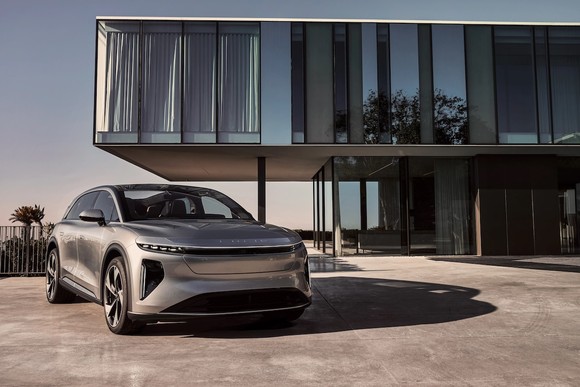Electric vehicle (EV) maker Lucid Group (LCID 2.46%) reported some good news recently; vehicle production and deliveries both increased significantly in 2024. As a result, Lucid's stock got a jolt as some investors grew more optimistic about the company's future.
But Lucid is still fighting an uphill battle in the EV market at a time when almost all electric vehicle makers are trying to boost sales. With the EV market in flux, let's take a closer look at the reasons to buy, sell, or hold Lucid.

Image source: Lucid.
The case for holding Lucid
I think there's a pretty compelling case for holding on to Lucid's shares. First, Lucid makes a great product. The company's Air sedan is an award-winning, high-end vehicle that's received plenty of accolades. Lucid's vehicles boast impressive features, like the longest EPA-estimated range of any EV on the market (516 miles!).
The company also recently reported solid vehicle production and delivery numbers. Lucid produced 9,029 vehicles in 2024, an increase of 7% from the previous year, and deliveries jumped 71% to 10,241 vehicles. While still relatively small compared to many other automakers, Lucid is making some progress on the delivery and production front.
Additionally, Lucid just started production of its Gravity SUV. The new vehicle means that Lucid will now sell EVs in two distinct automotive categories (sedans and SUVs), and that could help the company lower costs by sharing parts across models. There's no guarantee that its Gravity SUV will be a hit, but shareholders may want to stick around and see what happens.
Lastly, and perhaps most importantly, Lucid CEO Peter Rawlinson said in a recent Bloomberg TV interview that he's had a couple of conversations with automakers about a potential partnership. Specifically, Rawlinson said: "It would be lovely if we could supply technology to a traditional car company to help them on their way to sustainability, and perhaps we can leverage economies of scale with their parts bin and other aspects of the business."
It's common for automakers to partner with each other to share parts in order to lower costs. Lucid's losses were $992 million in the third quarter (ended Sept. 30, 2024), so a potential partnership could go a long way in helping the company dig itself out of that hole.
The case for selling Lucid
There are a handful of reasons for deciding to sell a stock, including:
- Rebalancing your portfolio
- Needing the money for something else (like a house downpayment)
- The original thesis for buying the stock has changed
- You've identified better investment opportunities
Lucid's share price has plummeted 93% over the past three years, so there's probably less of a chance that your Lucid stock accounts for a large portion of your portfolio. And only you can answer the questions about needing the money or whether your original investment thesis has changed.

NASDAQ: LCID
Key Data Points
But I think there's a strong case to be made that there are better investment opportunities out there. If you're a Lucid shareholder, then you likely know about other popular technologies, like artificial intelligence. Spending on AI data center infrastructure could grow by $2 trillion over the next five years, according to Nvidia's CEO, and many of the best AI companies are already experiencing significant share price gains.
AI is just one example of a potentially better investment opportunity. If you have significant money tied up in Lucid stock right now, it may be worth trimming your position and putting that money to work elsewhere.
The case for buying Lucid is weak
It may be tempting for some investors to look at Lucid's share price -- $2.96 as of this writing -- and assume the stock is cheap. But Lucid's shares have a price-to-sales (P/S) ratio of 9. That's far more expensive than fellow EV start-up Rivian Automotive's P/S ratio of 3.
Lucid is also losing lots of money -- $992 million in the third quarter -- and it will have to sell far more vehicles than it is right now to start narrowing its losses. One big hurdle is that the company's high-end models are beyond what most people can afford. For example, the Gravity SUV starts at $94,900 (a cheaper version is expected later this year).
Annual deliveries of just over 9,000 vehicles aren't going to dig Lucid out of its financial hole. Until the company can show that it can drastically reduce costs and significantly increase vehicle sales, it's best to leave Lucid's stock alone right now.